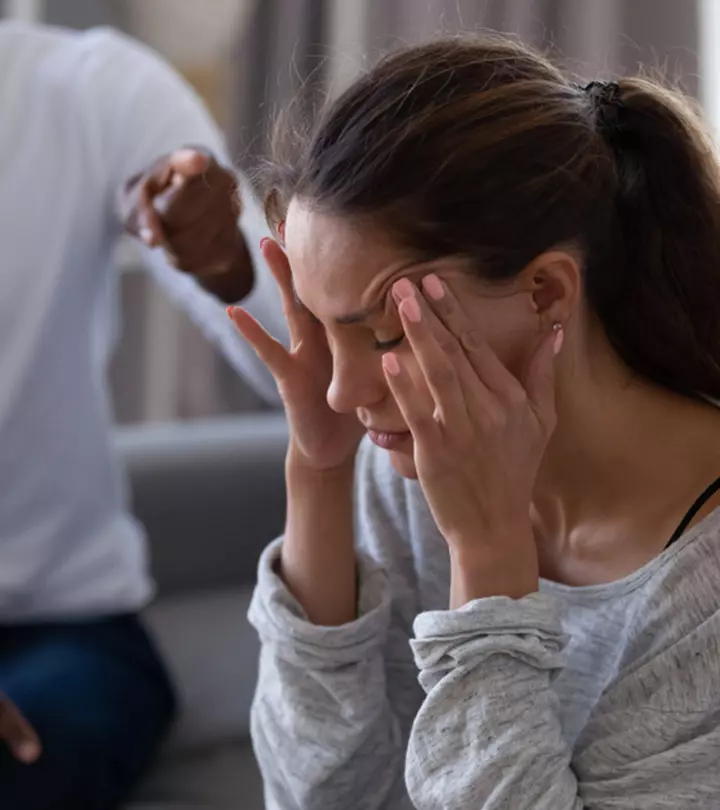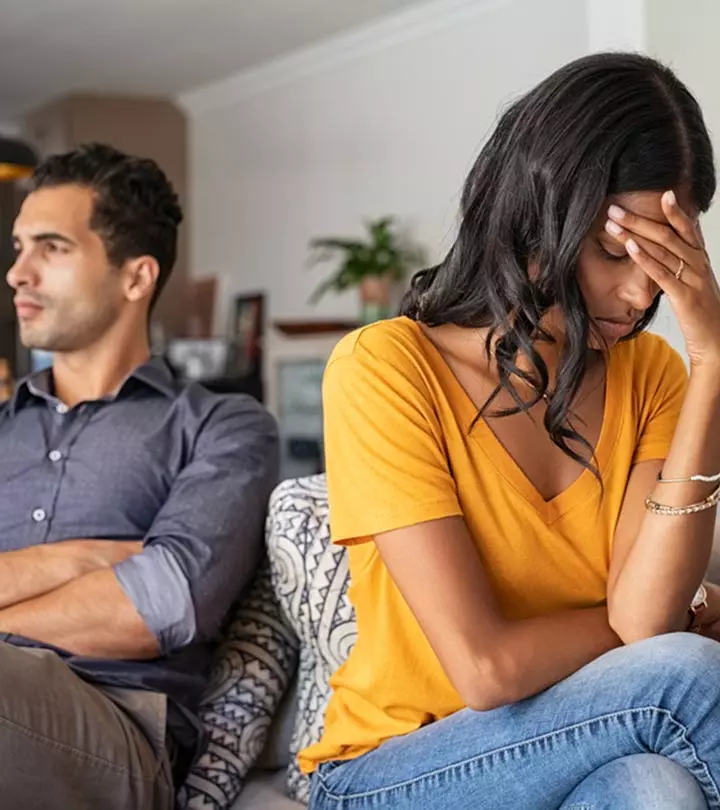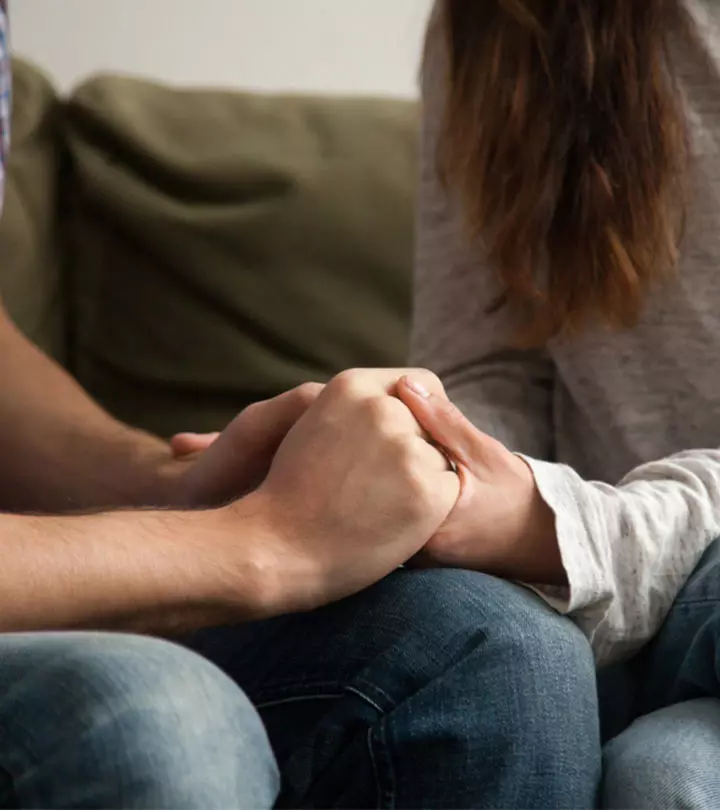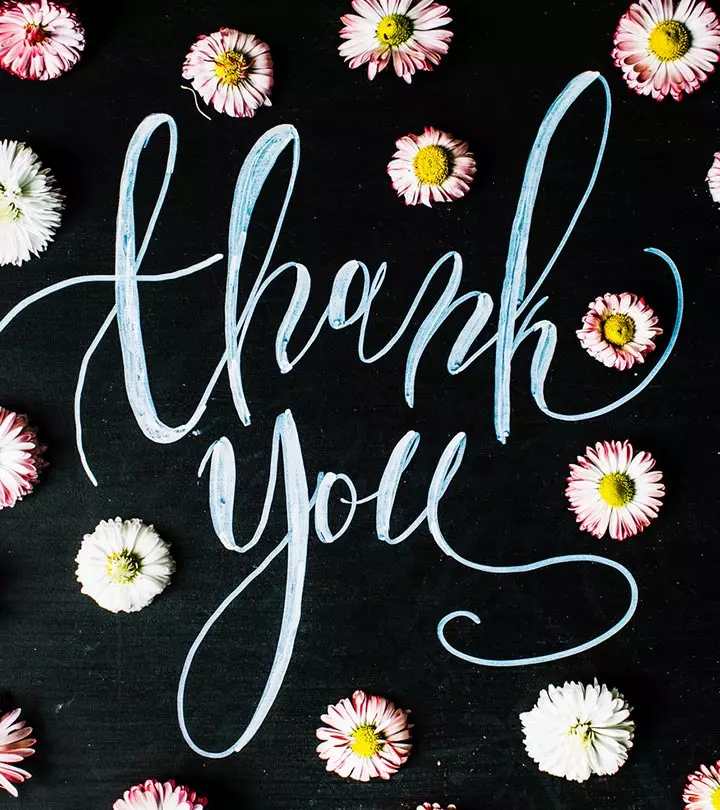Powerful Tips To Improve Communication In Relationships
Express & listen because life is too short to assume the other person can read your mind.

Image: Shutterstock
Misunderstandings, fights, and arguments are normal in every relationship. Effective and empathetic communication in relationships can help resolve these differences and bring the couple to a place of mutual understanding, reconciliation, and harmony. But, stonewalling, silent treatment, or communicating poorly can cause rifts in a relationship. The good news is you can learn how to communicate effectively to express your feelings without undermining or hurting your partner. Follow our simple yet powerful tips on how to improve communication in a relationship. Keep reading to know more!
In This Article
Why Is Communication In Relationships Important?
Communication helps build the base for a happy and healthy relationship. It allows you to convey your feelings, expectations, and needs. It enables you to feel connected with the other person in the relationship. Here are the factors that highlight the importance of communication in relationships:
- Enriches Companionship
One of the basic things you expect from your partner is companionship. It is normal to consider your partner as a friend with whom you can share your dreams, joys, concerns, and disappointments.
Good communication in a relationship nurtures the feeling of companionship. You feel more involved in the relationship when both of you share your interests, desires, and dislikes, discuss anything and everything and indulge in activities together, and make wonderful memories.
- Prevents Misunderstandings
Lack of communication with your partner may make you both start seeing things differently. This can make space for misunderstandings, which may eventually block all channels of communication.
Healthy communication helps prevent misunderstandings. Expressing your opinions, concerns, and dislikes can enable you to reach out to your partner and explain your point of view.
- Conveys Expectations
Everyone has some expectations from a relationship and their partner. Your partner can’t know your expectations when you do not communicate about them. This may eventually lead to hurt if they do something that does not match your expectations (which is not really their fault). Hence, it is essential to convey your expectations to your partner and agree upon how to meet them.
Maria Grazia, a blogger, emphasizes the critical role of communication in relationships by noting a personal incident, “In my experience communication is the only way to form a strong and lasting bond with another person. When my spouse and I first started dating we had very limited communication (i).” She did not want to seem like the only one invested in the relationship, hence, she did not take much initiative. She adds, “Finally I confronted my future spouse and expressed my feeling. By communicating my desires I found out that previous relationships had taught my spouse to take a hands off approach. By communicating my desires we found a good balance that allowed us to form a deeper relationship.”
Communication involves being able to talk openly about problems, understand each other’s perspectives, accept the other person’s point of view, and compromise when a resolution is required. Communication goes hand in hand with conflict. Words are our portal to connection and are the building blocks for communication. Therefore, be mindful of the impact your words can have on the other person.
Now you know the significance of communication in a relationship. Let us delve deeper and understand how to communicate in a relationship.
How To Communicate In A Relationship
The way you communicate can make or break your relationship. Here is how you can improve your communication in your relationships.
- Develop A Deep Connection
Many people believe that communication means having conversations. While conversations are a part of communication, there is more to it. Communication means developing a connection with your partner. You can use verbal, physical, and even written means to communicate and express yourself.
But you have to first accept the need for developing a deeper connection in your relationship. Start by talking to your partner and discussing things openly.
 Quick Tip
Quick Tip- Become An Active Listener
Communication is a two-way street. People often believe that they are listening to their partner, while they could simply be waiting for their partner to stop speaking so that they can put across their point. This sort of communication defeats its very purpose.
Try to become an active listener. Get into the habit of listening intently to what your partner is trying to convey. Rather than interrupting or getting defensive, make an effort to see things from their point of view first.
- Check Non-Verbal Communication
Communication is not limited to just what you say. You can express a lot more through non-verbal means of communication. Some non-verbal ways of communication include eye contact, hand gestures, tone of voice, facial expressions, posture, clenched jaws, rolling eyes, etc.
You may not even realize how much your body language or facial expressions can reveal to your partner. You may not say anything, but you could be conveying anger, disrespect, mistrust, distress, and a lot more. Your partner would react accordingly when they receive such non-verbal communication. Hence, be mindful of how you communicate non-verbally to avoid any miscommunication.
- Be Open And Honest
Honest and open communication can go a long way in strengthening the ground for a solid relationship. When you open up to your partner and communicate honestly, you minimize the chances of misunderstandings. Also, letting your partner know that you are not happy with something or do not approve of their actions or words is the first step towards addressing the issue.
Keeping things within yourself gives the impression that you are okay with whatever is happening. This can lead to much trouble and frustration in the relationship at a later date. Rather than holding yourself back, go ahead and openly agree to disagree.
- Accept When You Are Wrong
No one is perfect all the time. You must be ready to own your mistakes when you make one. Rather than being defensive or trying to justify your wrongdoing, admit to your partner when you make a mistake. Do not allow your ego to come in the way. Your partner may otherwise find it difficult to talk to you about your mistakes in the future as well. Talk about the matter frankly and move ahead together.
- Let The Past Stay Behind
Resist bringing up the past when you are having a discussion about the present. Let anything that happened in the past stay in the past. Bringing up unpleasant incidents from the past may take your present discussion in an unwanted direction. Instead, try to communicate effectively and see how you can tackle the present issues.
If you have any argument or disagreement, always bury the hatchet before moving on. Do not carry the past with you.
- Be Present In A Conversation
To be present in a conversation does not mean just being there physically. You need to be mentally involved in the communication. When you are responsive in a conversation, you send out positive signals to your partner. Even if you do not say much, having the right body language and communicating non-verbally can convey your involvement and create a space for better sharing your feelings and emotions.
 Quick Tip
Quick Tip- Do Away With The Assumptions
Assumptions are one of the biggest obstacles to effective communication. When you assume something, you put a barrier between yourself and the truth. Your assumption may or may not be correct. But your perception does not go beyond your assumption.
Rather than assuming things, reach out to your partner and ask questions to clear away any miscommunication or misunderstanding.
- Steer Clear Of Blame Games
Blaming your partner is the fastest way of building roadblocks in communication. Hurtful words can do more damage to your relationship than you can imagine. Rather than adopting an accusatory tone, bring empathy into your communication and your relationship.
If you realize that your partner is at fault, communicate it to them without blaming them. You need to find ways to resolve the issue without making your partner feel small or guilty.
- Avoid Criticizing Their Ways Frequently
As an extension of the previous point, constant criticism about your partner from time to time can lower your partner’s confidence levels and make them doubt their ability to do things in the right way.
Your partner may have certain ways of doing things or looking at life in general, which do not align with your personal preference. But demeaning them because of that can lead to stress, and frustration, and cut deep. It can also make your partner feel less loved and that they are not good enough for you. But the way you choose to communicate and address your grievances can make all the difference.
- Look From Your Partner’s Point Of View
When there is an argument or disagreement between you and your partner, it is normal to want your point of view to be understood. While it is fine to focus on how you perceive a situation, you must not forget the other side as well.
Hit the pause button for a while and consider the matter from your partner’s perspective. You will be able to communicate better with your partner this way.
- Talk About Varied Topics
Talking to your partner about how your day went may not hold much excitement. But when you start discussing a recent movie, music, books, or a new restaurant to explore in the city, your partner may feel more enthusiastic about participating. In essence, you are developing a sense of camaraderie with your partner. This can increase the emotional intimacy between you two.
- Set Your Phone Aside
Checking your phone while carrying out a conversation with your partner is a big NO. You would be sending out a non-verbal signal that the conversation is not so important to you. Make a sincere effort at effective communication by setting your phone aside while having a conversation with your partner. This will show them that you are genuinely interested in having the conversation.
- Avoid Negative Behavior
Screaming or raising your voice during an argument is a way of letting out your anger and frustration. However, such actions can make the situation more intense. Avoid indulging in negative behavior like yelling or walking away when you are in the middle of an argument. Such actions can stonewall your efforts of communication.
- Take Time Out
Take a break if the situation becomes too difficult to handle during a heated discussion with your partner. Let your partner know that you are taking time out to cool off. Go for a walk and come back to the issue after an hour or so, when you are less agitated. You will be able to communicate and put across your point better.
- Look For A Solution
The normal tendency while having a heated discussion is to try to win the argument. But focus on finding a solution instead. This shift in attitude can make communication easier.
The importance of communication in relationships is undeniable. It helps avoid misunderstandings, resolve issues, strengthen the bond, and understand what to expect from each other. However, there is more to communication than just engaging in conversations. It is also about striking a deep connection and paying attention to non-verbal communication, like body language, voice tone, and facial expressions. Always be a good listener, be honest, and have enough courage and magnanimity to accept your mistakes. Is your relationship lacking in communication? Try out the tips discussed in the article and get ready to be blown away by the results.
Frequently Asked Questions
What is proper communication in a relationship?
Being mindful and clear about what you want to communicate with your partner can be termed proper communication. Effective communication, which is an exchange of feelings and thoughts, can help manage conflicts in relationships.
What is unhealthy communication?
Unhealthy communication starts with negative thoughts and involves defensiveness, criticism, judgment, and shaming.
How do you communicate in a relationship without fighting?
You can communicate effectively with your partner without fighting. Begin your communication with some appreciation, be specific about what you need, and recognize your partner’s efforts. Also, remember to avoid blame.
Key Takeaways
- Honest communication using verbal, physical, and even written means helps to develop a connection with your partner.
- Beside communicating to express yourself, it is essential to become an active listener rather than interrupting or getting defensive.
- Making assumptions can fracture communication, so rather than assuming things, you should reach out to your partner and ask questions to clear away any miscommunication or misunderstanding.
Communication plays a pivotal role in relationships. It helps navigate all the highs, lows, and everything in between. Learn how communication becomes the lifeline that nurtures love and understanding in this insightful video. Click here.
Personal Experience: Source
StyleCraze's articles are interwoven with authentic personal narratives that provide depth and resonance to our content. Below are the sources of the personal accounts referenced in this article.
(i) Why Every Relationship is Like Elizabeth and Darcy’shttps://thesecretunderstandingofthehearts.blogspot.com/2013/07/why-every-relationship-is-like.html
Read full bio of Ronald Hoang
Read full bio of Shivani Chandel
Read full bio of Subhrojyoti Mukherjee
Read full bio of Sneha Tete




























Community Experiences
Join the conversation and become a part of our empowering community! Share your stories, experiences, and insights to connect with other beauty, lifestyle, and health enthusiasts.